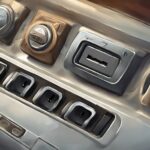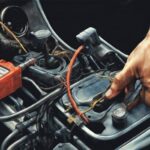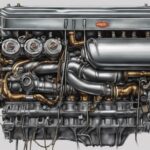The check engine light is there to let you know if there is a problem with the engine. One of the lesser known reasons for it to come on is because of a faulty fuel filter. So, how can a bad fuel filter cause a check engine light?
A bad fuel filter can trigger the check engine light because it can cause a range of problems with the engine’s fuel system. When a fuel filter becomes clogged or dirty, it can restrict the flow of fuel to the engine, leading to reduced engine performance, engine stalling, and other issues. These problems can trigger the engine’s sensors, which detect abnormal readings and signal the check engine light to turn on.
It can also trigger the check engine light if the clogged or dirty fuel filter is reducing the amount of fuel that reaches the engine resulting in a drop in fuel pressure.
It’s a good idea not to ignore a check engine light, as ignoring the issue can lead to more significant and costly problems down the road. If a clogged fuel filter is the culprit, it’s an easy fix as replacing it will usually solve the issue.
Can a Clogged Fuel Filter Cause the Check Engine Light to Come On?
A clogged fuel filter can cause a variety of problems for an engine. When the fuel filter is clogged, it restricts the flow of fuel to the engine, which can cause a decrease in performance and fuel efficiency.
In some cases, a clogged fuel filter can even cause the engine to stall or fail to start. One of the ways that a clogged fuel filter can cause the check engine light to come on is by causing a decrease in fuel pressure.
This decrease in fuel pressure can cause the engine to run lean, which means that there is too much air and not enough fuel in the fuel mixture. When this happens, the engine may misfire, run rough, or even stall. The ECU will detect this issue and trigger the check engine light to come on.
What Are The effects of contaminated fuel on the engine system?
Contaminated fuel can also cause the check engine light to come on. When fuel is contaminated with dirt, debris, or other particles, it can cause damage to the fuel system components, including the fuel filter.
Over time, this damage can cause the fuel filter to become clogged and restrict the flow of fuel to the engine. In addition to causing a decrease in fuel pressure, contaminated fuel can also cause damage to other engine system components, such as the fuel injectors and the fuel pump.
This damage can cause a decrease in engine performance and fuel efficiency, as well as trigger the check engine light to come on.
Symptoms of a Clogged Fuel Filter Leading to the Check Engine Light
A clogged fuel filter can cause a variety of symptoms that can lead to the check engine light coming on. Some of the most common symptoms of a clogged fuel filter include stalling, hesitation, hard start, engine misfire, rough idle, and decreased fuel economy.
These symptoms can occur gradually over time or suddenly and can vary in severity depending on the extent of the clog.
| Symptom | Explanation of how it can trigger the check engine light |
|---|---|
| Stalling | When a fuel filter is clogged, it restricts the flow of fuel to the engine. This can cause the engine to stall or shut off unexpectedly, which can trigger the check engine light. |
| Hesitation | A clogged fuel filter can cause the engine to hesitate or stumble during acceleration. This abnormal fuel flow to the engine can cause the check engine light to come on. |
| Hard start | If the fuel filter is clogged, it can prevent the engine from starting. This can cause the check engine light to come on as the engine struggles to start and run. |
| Engine misfire | A clogged fuel filter can cause the engine to misfire, which can cause the check engine light to come on. This can also lead to decreased performance and increased emissions. |
| Rough idle | If the fuel filter is clogged, it can cause the engine to idle roughly or stall. This can trigger the check engine light as the engine struggles to maintain a consistent idle speed. |
| Decreased fuel economy | A clogged fuel filter can cause the engine to work harder to maintain performance, which can lead to decreased fuel economy. This can cause the check engine light to come on as the engine struggles to maintain efficiency. |
What Is A Car Fuel Filter?
A fuel filter is a critical component in a vehicle’s fuel system. It is responsible for filtering out any impurities or particles that may be present in the fuel, such as dirt, rust, or debris. These particles can clog fuel injectors, damage the fuel pump, and cause other issues in the fuel system.
Types of Fuel Filters
There are two main types of fuel filters: inline and cartridge. Inline fuel filters are typically located in the fuel line between the fuel tank and the engine. Cartridge fuel filters are typically located in the engine compartment and are replaced as a unit.
Both types of fuel filters work in a similar way. They contain a filter element made of a porous material that traps particles as fuel flows through it. Over time, the filter element becomes clogged with particles and needs to be replaced.
It is important to replace the fuel filter at regular intervals, as recommended by the vehicle manufacturer as failing to do so can lead to decreased fuel efficiency, engine performance issues, and even engine damage.
What Next – Diagnosis And Repair Of A Fuel Filter Related Check Engine Light
When it comes to diagnosing a fuel filter-related check engine light, there are a few steps that you need to follow.
These steps involve a combination of visual inspections, diagnostic tests, and computer analysis to determine the root cause of the problem.The first step in diagnosing a check engine light is to visually inspect the vehicle for any obvious signs of damage or wear.
This includes checking the fuel filter for any signs of clogging or damage. If no issues are found during the visual inspection you will need to carry out a diagnostic readout of the ECU memory using a suitable OBD-II scanner.
Diagnostic tests can also involve testing various components of the vehicle’s fuel system. This includes testing the fuel pressure, fuel volume, and fuel quality. You may need to enlist the help of a mechanic as fuel systems can be complicated and they also operate under very high pressure, so specialized equipment is necessary.
Here are the steps involved in diagnosing and fixing a bad fuel filter:
Diagnosing the problem: The first step in diagnosing a bad fuel filter is to check for symptoms such as reduced engine performance, engine stalling, and decreased fuel efficiency. These symptoms can be caused by a range of issues, so it is important to perform a proper diagnosis to determine if the fuel filter is the culprit.
One way to diagnose a bad fuel filter is to use a fuel pressure gauge to test the fuel pressure in the system. If the pressure is lower than the manufacturer’s specifications, it may indicate a clogged fuel filter.
Another way to diagnose the problem is to use an OBD scanner to check for error codes related to the fuel system, such as those listed in the table below:
| OBD Error Code | Description | Symptoms |
|---|---|---|
| P0172 | System Too Rich (Bank 1) | Reduced engine performance, engine stalling, decreased fuel efficiency |
| P0175 | System Too Rich (Bank 2) | Same as P0172 but refers to the other bank of cylinders in the engine |
| P0300 | Random/Multiple Cylinder Misfire Detected | Engine misfires, reduced engine performance |
| P0301 | Cylinder 1 Misfire Detected | Misfire in the first cylinder, engine cutting out |
| P0302 | Cylinder 2 Misfire Detected | Misfire in the second cylinder, engine cutting out |
| P0303 | Cylinder 3 Misfire Detected | Misfire in the third cylinder, engine cutting out |
| P0304 | Cylinder 4 Misfire Detected | Misfire in the fourth cylinder, engine cutting out |
| P0180 | Fuel Temperature Sensor A Circuit Malfunction | Reduced engine performance, decreased fuel efficiency |
| P0190 | Fuel Rail Pressure Sensor Circuit Malfunction | Reduced engine performance, decreased fuel efficiency |
| P0191 | Fuel Rail Pressure Sensor Circuit Range/Performance | Reduced engine performance, decreased fuel efficiency |
| P0192 | Fuel Rail Pressure Sensor Circuit Low Input | Reduced engine performance, decreased fuel efficiency |
| P0193 | Fuel Rail Pressure Sensor Circuit High Input | Reduced engine performance, decreased fuel efficiency |
| P2195 | O2 Sensor Signal Biased/Stuck Lean (Bank 1 Sensor 1) | Lean fuel mixture, reduced engine performance |
| P2196 | O2 Sensor Signal Biased/Stuck Rich (Bank 1 Sensor 1) | Rich fuel mixture, decreased fuel efficiency |
| P2270 | O2 Sensor Signal Biased/Stuck Lean (Bank 1 Sensor 2) | Lean fuel mixture, reduced engine performance |
| P2271 | O2 Sensor Signal Biased/Stuck Rich (Bank 1 Sensor 2) | Rich fuel mixture, decreased fuel efficiency |
Replacing the fuel filter: Once the problem has been diagnosed as a bad fuel filter, the next step is to replace the filter. This can typically be done with basic hand tools and does not require specialized equipment.
However, the process can vary depending on the make and model of the vehicle, so it is important to consult the vehicle’s owner’s manual or a repair manual for specific instructions. It is also important to use the correct replacement filter for the vehicle.
Testing the system: After replacing the fuel filter, it is important to test the system to ensure that it is functioning properly. This can be done by checking the fuel pressure again or by driving the vehicle and monitoring for any recurring symptoms. It is also a good idea to clear any error codes using an OBD scanner to ensure that the check engine light does not come back on.
Prevention and Maintenance of Fuel Filter-Related Check Engine Light
Preventing a fuel filter-related check engine light is fairly simple. Regular maintenance is key to keeping your vehicle running smoothly. It is recommended to replace the fuel filter every 30,000 miles or as recommended by the manufacturer.
Modern vehicles have complicated fuel systems that require a clean fuel supply to operate efficiently. A clogged fuel filter can cause low fuel pressure, which can lead to hard starting or engine misfire. In some cases, it can even cause the fuel pump to fail.
Regular maintenance of the fuel filter can prevent these issues from happening. It is also recommended to check the fuel pressure regularly to ensure that the fuel system is operating at the correct pressure.









